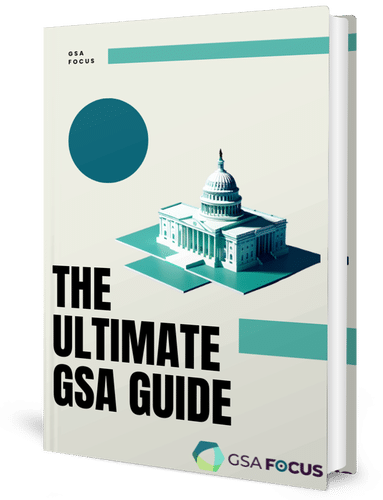To further the General Services Administration (GSA) initiatives, they established the Multiple Award Schedules (MAS) program. Among the four market strategies of GSA, the MAS program aims to implement strategies within the federal government market. This initiative allows both the buyers and the vendors to streamline the acquisition, making the entire transaction a breeze.
With the goals of modernizing and simplifying federal acquisition of products and services, it is easier for federal agencies to find total solutions in a single contracting vehicle. MAS consolidates all 24 GSA Schedule contracts for a single purchase. Overall, this eliminates the extra measures taken to meet the consumers’ requirements, remain compliant to FAR, and additional administrative work.
What is GSA eBuy, and How does GSA eBuy work?
Table of Contents
ToggleGSA eBuy is the acquisition platform exclusively for businesses with GSA Schedules and agency buyers. In other words, it is the one-stop tool to help companies to find opportunities and assist federal buyers in making requests and inquiries.
To help you understand the importance of the platform in the government marketplace, here is how the GSA eBuy works:
- Businesses are required to register to the platform after being awarded a GSA contract.
After receiving the GSA Schedule contract, businesses need to register on the GSA eBuy platform. This registration allows them to find contracting opportunities, place bids, and expose their company to many federal buyers.
- The Special Item Number (SIN) of the business responding to the offer must fall under the adequate Schedule.
The SIN refers to the specific code for particular products and services requirements within the GSA. It is important to note that the eBuy system would only accept transactions between businesses that have matching SINs to their Schedules. In other words, companies can only respond to Request For Quotations (RFQs) and other forms of solicitation if they have matching SINs. Upon receiving solicitations, those with GSA Schedule contracts get notified automatically of the opportunities. All they need to do is to sign in to eBuy to respond to the offers accordingly.
- Bidding on Solicitations Through GSA eBuy
There are particular requirements to placing a bid on different types of solicitations. It is important to note that the only one that can view the bids is the buyer. In other words, the federal agencies that posted the Request for Quotation (RFQ) see your response. This requirement indicates that GSA contractors have no way of knowing that certain buyers still receive offers and whether they can still place a bid late to the game.
- How do federal agencies select from several GSA contractors?
GSA Schedule holders must keep in mind that responding to RFQs does not imply contract obligations with the federal agency. It is integral that businesses submit complete information when placing a bid promptly. Although submitting a proposal early and making sure the bid is low does not guarantee business with federal agencies, they must remain compliant. After all, most federal agencies consider various terms and conditions in the contract before selecting the most suitable proposal.
- What happens after the federal buyers have selected a GSA contractor?
The federal buyer will notify the chosen GSA Schedule contractor via the GSA eBuy platform. The rest of the bidders are also informed of the outcome before the system finally closes the solicitation.
What is MAS Consolidation?
To keep up with the increasing demands of the public sectors, the General Services Administration (GSA) established MAS consolidation. In 2018, the GSA introduced the Multiple Awards Schedule program to consolidate the 24 Schedules into a single GSA Schedule. This program provides a centralized contract solution for all federal agencies while streamlining the acquisition process. Simply put, the consolidation of GSA Schedules into a single contracting vehicle promotes efficiency and convenience.
The public sector can still access all 24 GSA schedule services. However, the only difference is the centralized contracting environment across all GSA Schedules. As a result, this program eliminates multiple duplicate contracts and workload for both the business and federal GSA. Instead of handling administrative works, auditing, and negotiating contracts, businesses can go straight to acquiring the complex, fixed-priced products and labor-hour professional services. It makes handling specific documents more straightforward to help companies to provide supplies as soon as possible.
How to Bid on GSA Contracts?
As the saying goes, “knowledge is power.” If you know more about landing a government contract, the higher the chances are that you can get awarded one. Obtaining a federal contract is a months-long process that requires hard work and investment. You are looking at a wider reach and bigger revenue.
First and foremost, you have to maintain a solid track record that proves your worth as a business. The performance of your business over the past years reflects your reputation and the quality of your offerings. Secondly, companies must establish a promising proposal that features their pricing negotiation and acquisition strategy. All of these are up for the contracting officer’s approval, so businesses must give their all.
How will MAS Consolidation Impact GSA eBuy?
Following the MAS consolidation changes, most GSA contractors are confused about how it affected their business. Businesses don’t need to worry whether their old SIN can remain relevant despite the new system. The GSA eBuy platform detects the old format of SINs, making it still possible to find opportunities. Another important impact of MAS consolidation is the ability to solicit for an entire category or subcategory. Instead of looking for matching SINs one by one, they can post RFQs much faster. The GSA contractors can explore the opportunities that the agency didn’t release under a specific SIN they can now hold.
Here are several ways how MAS consolidation affected the GSA eBuy platform:
- Businesses don’t need to worry about their contract number and its expiration because it will not change.
- Even before MAS consolidation, companies can still renew their GSA contract the same number of times.
- Re-negotiation of prices, delivery terms, and labor categories is not necessary.
- GSA contractors are required to sign the Mass Modification of every contract they hold. Otherwise, the GSA cannot assign your agreement with a SIN.
- The texts within FAR and GSAR are not revised.
- GSA Schedule contract holders can still accept orders beyond MAS consolidation.
- For GSA contractors that handle more than one contract, they have the option to consolidate them into one.
Conclusion
GSA introduced MAS consolidation to strengthen the connection between buyers and sellers, streamlining the procurement of products and services. Providing a more organized network for handling multiple Schedules, federal agencies would only need a single contracting vehicle for acquiring numerous services. The updates make consolidated Schedules accessible to vendors and sellers released from GSA eBuy in July 2020. This accessibility allows federal agencies to issue Requests for Information (RFI) in a specific category instead of doing it by SIN.



